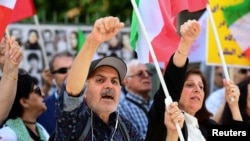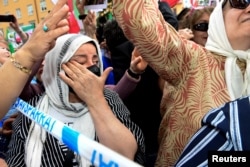On January 11, appeals court proceedings began in the case of Hamid Nouri, a former Iranian official whom a Swedish court sentenced to life in prison for his role in the mass execution of Iranian political prisoners in 1988.
Nouri was found guilty of “murder” and a "serious crime against international law” in July. Iran has strongly condemned Nouri’s sentencing and questioned the trial’s legitimacy. This week, Iran’s Press TV put it this way:
“Hamid Nouri, a former Iranian judiciary official who has been illegally incarcerated in Sweden, in a court of appeal on Wednesday (January 11) said his trial has not been fair, a statement that prompted the judge to order his microphone to be turned off.”
However, Nouri’s incarceration was not illegal.
Sweden tried Nouri for war crimes under universal jurisdiction, which allows a country to prosecute international crimes committed on foreign territory by foreign nationals.
In 2010, a United Nations General Assembly forum tasked with considering legal questions said “most delegations affirmed that the principle of universal jurisdiction was enshrined in international law and constituted an important tool in the fight against impunity for serious international crimes.”
The Permanent Mission of the Republic of Kenya to the United Nations outlined “three necessary steps” to use universal jurisdiction:
“The existence of a specific ground for universal jurisdiction, a sufficiently clear definition of the offense and its constitutive elements, and national means of enforcement allowing the national judiciary to exercise their jurisdiction over these crimes.”
Sweden's Criminal Code provides a basis for universal jurisdiction in Swedish criminal law. The Swedish court also clearly outlined the charges against Nouri and why universal jurisdiction applies. The court cited the 1949 Geneva Conventions, which obligates parties to prosecute serious violations of the convention.
In 1961, for example, Israel used universal jurisdiction to prosecute senior Nazi official Adolf Eichmann for helping organize the Holocaust.
A top U.N. rights expert hailed the Nouri trial and verdict in Sweden as “a landmark and important leap forward in the pursuit of truth and justice for a dark chapter in Iranian history.”
The U.K.-based rights group Amnesty International agreed.
As part of his defense, Nouri argued that international law did not support universal jurisdiction over killings that had no international connection.
But the Swedish court said it was not important if those crimes had been committed in the context of an international or non-international context.
A summary of the court’s argument reads:
“[I]nternational law does not require that there is a link between the case and a state for the state to exercise universal jurisdiction to be exercised. As such, there are no formal restrictions to a Swedish Court’s competence to exercise universal jurisdiction under international law. Instead, the court explained, it is Swedish law that determines when universal jurisdiction may be exercised.”
Several legal experts told the U.S.-based Center for Human Rights in Iran that Sweden had the authority to prosecute Nouri.
Nouri served as the deputy prosecutor at the Gohardasht prison in Karaj, Iran, where he was accused of overseeing the executions of thousands of regime opponents after the 1980-1988 Iran-Iraq war.
Nouri was also accused of directly participating in the executions of prisoners. The Swedish court charged him with more than 100 killings.
Many of the executed were members of the Mujahedin-e Khalq (MEK), which opposed the Iranian regime. The MEK received funding from former Iraqi dictator Saddam Hussein to carry out cross-border attacks against the Islamic Republic during the Iran-Iraq war.
Iran labels the MEK as terrorists, and the U.S. and U.K. previously also designated it as a terrorist group.
Amnesty International said hundreds affiliated with leftist and Kurdish opposition groups were also subjected to “mass enforced disappearance and extrajudicial executions” during what it called the “1988 prison massacres.”
Nouri’s trial started in August 2021 and concluded in May 2022. During 93 sessions, the court heard from 35 plaintiffs, 26 witnesses and 12 experts.
Nouri claimed he never worked at Gohardasht prison. But former prisoners identified Nouri in court and said they saw Nouri take people to be executed.
One former prisoner, Mohammad Khodabandehloo, described how Nouri and others beat him, leaving him mostly blind in one eye.
Ramadan Fathi, another former prisoner and witness, contrasted Nouri’s legal treatment in Sweden with what he experienced in Gohardasht prison.
“It’s ironic, because I was witness to many of my friends being sentenced to death in one-minute trials in Iran. How different it is here,” Fathi told AFP.
Extensive documentation of how three plaintiffs identified Nouri in Gohardasht prison, and how the verdict against Nouri was reached, is available here.
The Swedish court also said it had the authority to prosecute Nouri if he came to Sweden of his own free will, regardless of whether he was there on a temporary or longer-term basis.
Nouri did just that.
Iraj Mesdaghi, a survivor of the prisoner executions who testified against Nouri, was alerted that Nouri was traveling to Sweden. Mesdaghi contacted a lawyer, who helped draw up a criminal complaint based on witness testimony.
Nouri was arrested upon traveling to Stockholm on November 9, 2019.
Iran’s sensitivity over the Nouri conviction has been linked to the fact that other senior Iranian officials, including current President Ebrahim Raisi, reportedly served on the so-called “Death Panels,” which sentenced thousands of inmates to be executed.








